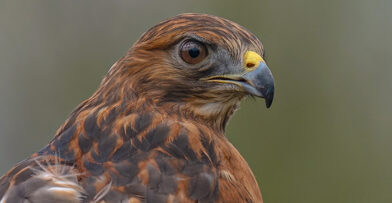Schlitz Audubon is excited to announce the addition of a Red-shouldered Hawk (Buteo lineatus) into our Raptor Program. Atlas, a beautiful adult female, is the first of her species to be represented in our Program.
Atlas, Our New Teacher
Atlas joins our team of feathered ambassadors to elevate our message of conservation and ecological awareness. As an adult in the wild, she was hit by a car and found herself in wildlife rehabilitation. The incident resulted in permanent damage to her left wing, taking away her ability for strong flight. She was deemed non-releasable and moved into an education role with Nature’s Educators, a facility near Denver, CO. After hearing that our Raptor Program was looking to add this species, the Executive Director of Nature’s Educators offered to transfer Atlas to us, to continue her important work educating the public about her species. We are grateful to Nature’s Educators and to those who volunteered to transport her to us.
About the Species
Red-shouldered Hawks are medium sized hawks in the Buteo genus, a group of raptors that includes Red-tailed, Broad-winged, and Rough-legged Hawks. Adults have a deep rufous chest and belly, with fine, dark barring down the body. In flight, distinctive red ‘patches’ cover the shoulders, and their wings and tail are boldly banded in black and white.
Red-shouldered Hawks depend on wetlands and swampy areas for hunting. Although they are generalists, feeding on a variety of prey species, a large portion of their diet includes fish, reptiles, amphibians, and invertebrates. They prefer mature hardwood forests near shallow water or wetlands.
Red-shouldered Hawks in Wisconsin
This species is found mainly in the eastern part of the United States, with Wisconsin being the northern-most region of their distribution. In our state, the hawks are considered “partial migrants,” which means that only a portion of the population will migrate while others stay here year-round. In the fall, migrants move to southern Illinois or into southern states, returning north in the spring for breeding.
Over the past several decades, the Red-shouldered Hawk population has been declining in the Midwest. Environmental organizations attribute their low numbers to the loss of proper nesting habitat. Because of this, Red-shouldered Hawks are threatened in the state of Wisconsin.
In our Raptor Program, Atlas will teach about migration along the Mississippi Flyway and the importance of habitat and wetland conservation. She will also offer unique opportunities for people to engage with this beautiful species!


